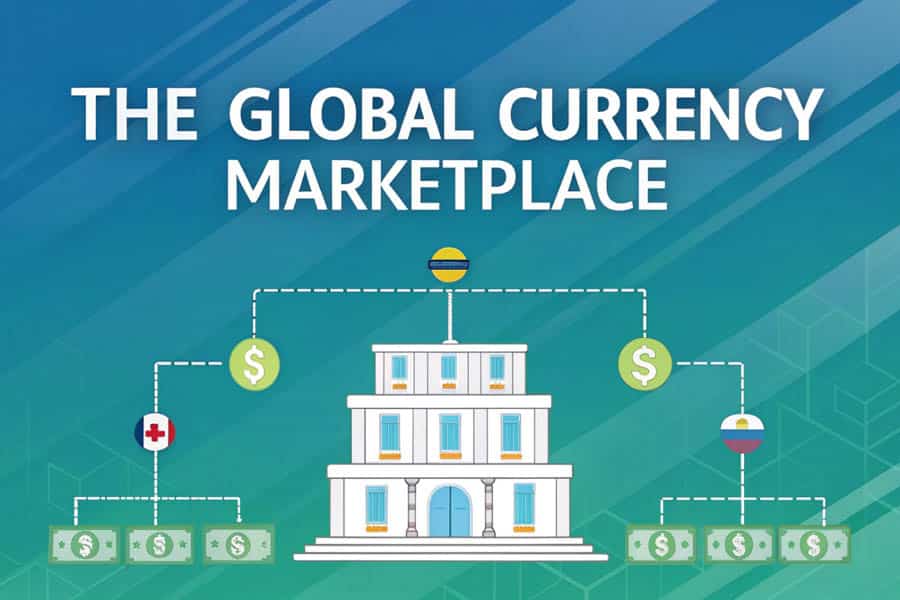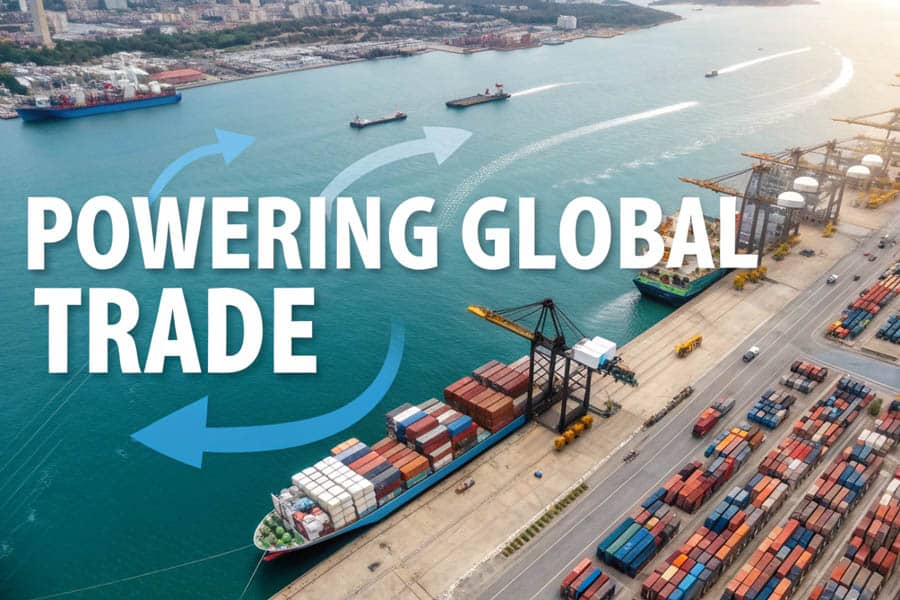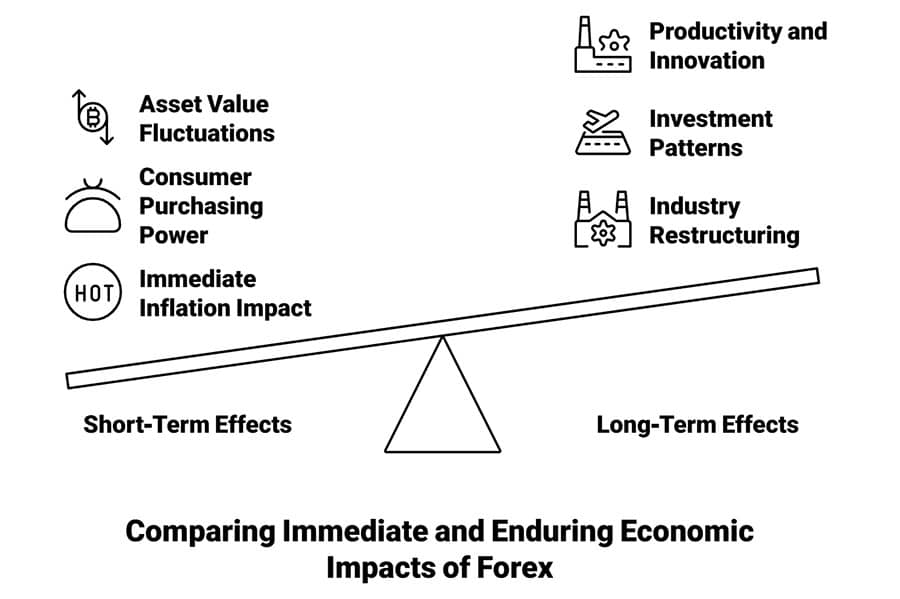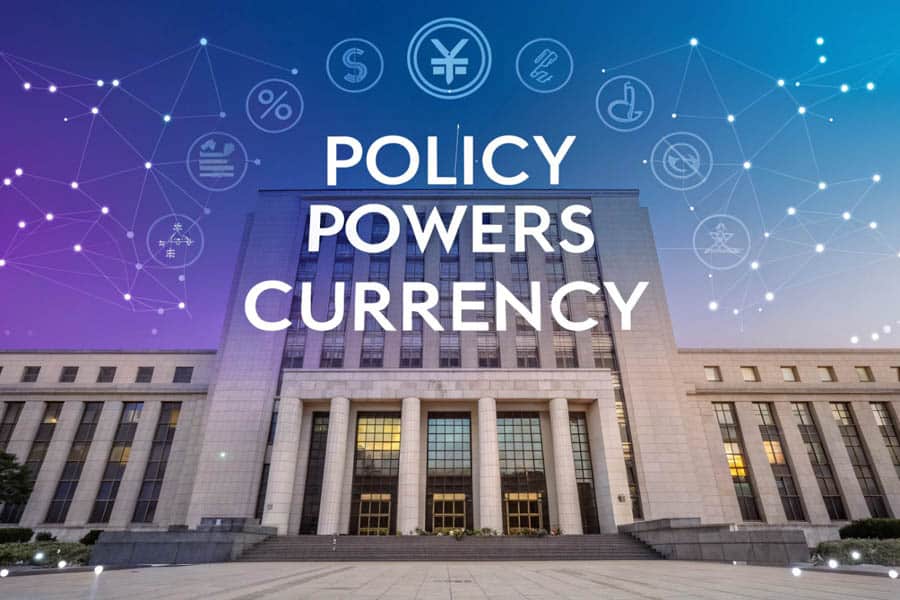The foreign exchange market (forex) forms the backbone of global financial interactions, serving as the primary mechanism through which currencies are exchanged to facilitate international trade, investment, and economic growth. When examining how does forex affect economy, we must recognize that currency fluctuations have profound and far-reaching impacts across all economic sectors. Foreign exchange rates directly influence a nation’s trade competitiveness, inflation levels, employment rates, and overall economic stability.

For businesses engaged in international commerce, households purchasing imported goods, and investors seeking opportunities abroad, the dynamics of forex markets create both challenges and opportunities. As regulated forex brokers continue to make currency trading more accessible to retail participants, understanding these economic relationships becomes increasingly important for everyone from policy makers to individual traders. It is crucial to understand how does foreign exchange affect the economy in today’s interconnected world.
What is Forex and How Does it Work?
The foreign exchange market, commonly known as forex or FX, is a global decentralized marketplace where currencies are traded against one another. Unlike stock exchanges that operate from physical locations with set trading hours, the forex market operates 24 hours a day, five days a week, across major financial centers worldwide. This continuous operation enables seamless trading across different time zones and ensures the market remains highly liquid and accessible. Understanding how foreign exchange affect the economy starts with grasping the basics of this market.

At its core, forex involves the simultaneous buying of one currency and selling of another, creating what’s known as a currency pair. The exchange rate represents the relative value between these two currencies, indicating how much of the quote currency is needed to purchase one unit of the base currency.
Market Structure and Participants
The forex market operates through a tiered structure with different levels of access and influence:
Tier 1: This top level consists of major commercial and central banks, large financial institutions, and sovereign wealth funds. These participants have direct access to the interbank market, where the largest volume of trading occurs and exchange rates are primarily determined.
Tier 2: This middle tier includes smaller banks, large corporations, hedge funds, and some institutional investors who access the market through Tier 1 participants.
Tier 3: The retail market comprises individual traders, small businesses, and retail investors who typically access forex through brokers and online trading platforms. While this tier represents a smaller portion of total trading volume, it has grown significantly with the proliferation of online forex trading brokers. The increasing participation of retail traders highlights the importance of understanding how does forex affect economy at all levels.
Currency Valuation Mechanics
Exchange rates are fundamentally determined by the forces of supply and demand in the market. When demand for a currency increases relative to supply, its value appreciates; conversely, when supply exceeds demand, its value depreciates. However, several key factors influence these supply-demand dynamics, ultimately impacting how foreign exchange affects the economy:
- Interest rates and monetary policy: Higher interest rates typically attract foreign capital, increasing demand for the currency.
- Economic indicators: Data such as GDP growth, inflation rates, and employment figures signal economic health and influence currency valuation.
- Trade balances: Countries with trade surpluses typically see stronger currencies as foreign buyers must purchase the local currency to buy exports.
- Political stability: Currencies of politically stable nations generally attract more investment and maintain stronger valuations.
- Market sentiment: Trader perceptions and speculative activity can drive short-term currency movements independent of economic fundamentals.
Read More: How Interest Rates Affect Forex Market
The Role of Forex in International Trade

Facilitating Global Commerce
Foreign exchange markets serve as the essential intermediary that enables international trade by providing the mechanism for currency conversion. When a French company purchases American machinery, it must convert euros to dollars to complete the transaction. Similarly, when an American consumer buys French wine, dollars must be exchanged for euros somewhere in the payment process. This continuous exchange of currencies facilitates the smooth flow of goods and services across borders. This function is fundamental to how forex affects economy on a global scale.
Beyond basic currency conversion, forex markets offer tools to manage currency risk. Importers and exporters can use forwards, futures, and options to lock in exchange rates for future transactions, providing predictability in an environment where currency values constantly fluctuate. This ability to hedge currency exposure enables businesses to focus on their core operations rather than speculating on exchange rate movements.
Export Competitiveness and Import Costs
How currency strength impacts a nation’s trading position represents one of the most direct ways how foreign exchange affects the economy. When a currency depreciates:
- Exports become cheaper for foreign buyers, potentially increasing export volumes and stimulating domestic production
- Imports become more expensive for domestic consumers, potentially reducing import volumes
- Domestic products gain a price advantage over imported alternatives in the local market
Conversely, when a currency appreciates:
- Exports become more expensive for foreign buyers, potentially reducing export volumes
- Imports become cheaper for domestic consumers, potentially increasing import volumes
- Imported products gain a price advantage over domestic alternatives in the local market
These dynamics create significant implications for trade balances, industrial competitiveness, and economic growth. For instance, China has historically maintained a relatively weak yuan to support its export-driven economy, while Switzerland has sometimes intervened to prevent excessive appreciation of the Swiss franc to protect its export sectors. Understanding these trade dynamics is key to understanding how does forex affect economy.
Exchange Rate Pass-Through
The degree to which exchange rate fluctuations affect consumer prices—known as exchange rate pass-through—varies significantly across countries and products. Several factors influence this relationship, impacting how foreign exchange affects the economy through inflation:
- Market structure and competition levels in import markets
- Pricing strategies of foreign exporters
- Product differentiation and substitutability
- Domestic inflation expectations and monetary credibility
In practice, pass-through is often incomplete, meaning currency fluctuations aren’t fully reflected in consumer prices. For example, a 10% depreciation in currency might lead to only a 4-6% increase in import prices, as foreign exporters absorb some of the difference by adjusting profit margins to maintain market share.
Short-Term and Long-Term Effects of Forex on the Economy

Immediate Economic Impacts
In the short term, exchange rate fluctuations can rapidly affect several aspects of an economy, demonstrating how does forex affect economy in the immediate term:
Price Stability and Inflation: When a currency depreciates, the cost of imported goods rises almost immediately. This directly impacts inflation through two channels: higher prices for imported consumer goods and increased costs for businesses using imported inputs. For example, following the Brexit referendum in 2016, the British pound depreciated significantly, contributing to an inflation spike of approximately 1.7 percentage points within one year.
Consumer Purchasing Power: Currency depreciation reduces domestic consumers’ ability to purchase foreign goods and services, effectively lowering their real income and purchasing power. This impact is particularly pronounced for economies that rely heavily on imported necessities like food, medicine, or energy.
Asset Values: Exchange rate movements quickly affect the domestic currency value of foreign-denominated assets. When a currency depreciates, domestically-held foreign assets increase in local currency value, while foreign-held domestic assets decrease in foreign currency value.
Financial Market Volatility: Sudden currency fluctuations often trigger responses across other financial markets, including equities, bonds, and commodities, as investors reassess risk exposures and return expectations.
Read More: Inflation Impact on Forex Market
Enduring Economic Transformations
Over the long term, persistent exchange rate trends can fundamentally reshape an economy, showcasing how foreign exchange affects the economy over extended periods:
Industry Restructuring: Extended periods of currency strength or weakness can trigger structural changes in the domestic economy. A persistently strong currency may accelerate the decline of traditional manufacturing as production shifts to lower-cost countries, while potentially stimulating growth in service sectors less sensitive to international price competition.
Investment Patterns: Long-term exchange rate trends influence both domestic and foreign investment decisions. A gradually depreciating currency may attract foreign direct investment aimed at export production, while a consistently appreciating currency might encourage domestic firms to invest abroad.
Productivity and Innovation: Currency pressure can drive productivity improvements. Firms facing intense import competition due to a strong domestic currency must innovate and increase efficiency to remain competitive, potentially raising long-term productivity growth.
Economic Rebalancing: Persistent trade imbalances associated with misaligned exchange rates eventually trigger economic adjustments. Countries with chronically undervalued currencies often experience excessive investment, asset bubbles, and inflationary pressure, while those with overvalued currencies may face industrial hollowing, unemployment, and deflation.
Key Economic Indicators Affected by Forex

Trade Balance Dynamics
The trade balance—the difference between a country’s exports and imports—remains one of the economic indicators most directly influenced by exchange rates. Understanding this relationship is crucial to see how does forex affect economy. This relationship works through several mechanisms:
Export Competitiveness: When a currency depreciates, domestically produced goods become cheaper for foreign buyers, potentially increasing export volumes. However, this effect depends on price elasticity of demand and the degree to which exports incorporate imported components (which become more expensive with depreciation).
Import Affordability: Currency depreciation makes imports more expensive in local currency terms, potentially reducing import volumes. Again, this effect depends on price elasticity and the availability of domestic substitutes.
J-Curve Effect: Following currency depreciation, the trade balance often initially worsens before improving. This occurs because import prices rise immediately while export volumes respond more slowly, creating a J-shaped curve when plotting the trade balance over time.
In practical terms, countries like Japan have historically experienced trade balance improvements during periods of yen weakness, while seeing deterioration during periods of significant appreciation. Similarly, the euro’s significant depreciation against the dollar between 2014 and 2015 contributed to the eurozone’s improving current account position during that period.
Read More: Is forex legal?
Inflation Transmission Mechanisms
Exchange rates influence inflation through multiple channels, creating complex relationships that vary across economic contexts. These mechanisms are central to how foreign exchange affects the economy through price levels:
Direct Price Effects: Currency depreciation increases the domestic price of imported finished goods, directly contributing to consumer price inflation. This effect is particularly strong for economies with high import dependence.
Input Cost Pressures: When domestic producers rely on imported raw materials, components, or equipment, currency depreciation increases their production costs. These higher costs may eventually pass through to consumer prices, creating second-round inflationary effects.
Wage and Price Expectations: Significant currency movements can affect inflation expectations among businesses and workers. If currency depreciation leads economic actors to expect higher inflation, they may adjust pricing and wage demands accordingly, potentially creating self-fulfilling inflationary spirals.
Competitive Effects: Currency movements affect the relative price of tradable versus non-tradable goods within an economy. Depreciation increases the price of tradables relative to non-tradables, potentially shifting demand patterns and influencing sectoral inflation rates differently.
Turkey’s recent economic challenges illustrate these mechanisms dramatically. The Turkish lira lost approximately 44% of its value against the dollar in 2021 alone, contributing significantly to the country’s inflation rate exceeding 80% by 2022. This extreme case demonstrates how forex affects economy, specifically how currency collapse can trigger runaway inflation when monetary policy fails to maintain stability.
Employment Effects Across Sectors
Exchange rate fluctuations create winners and losers in labor markets, with impacts distributed unevenly across industries and worker skill levels. This uneven distribution is another facet of how does forex affect economy:
Export-Oriented Industries: Currency depreciation typically benefits employment in export-focused sectors like manufacturing, agriculture, and certain services. These industries gain competitiveness and may expand production and hiring.
Import-Competing Industries: Sectors facing significant import competition also generally benefit from currency depreciation, as domestic products become relatively cheaper compared to imports. This can preserve or create jobs in these industries.
Import-Dependent Industries: Businesses relying heavily on imported inputs face cost pressures when the currency depreciates. These higher costs may constrain expansion or even force contraction, negatively affecting employment.
Non-Tradable Sectors: Industries primarily serving domestic markets with limited international competition (like local services) are less directly affected by exchange rates but may experience indirect effects through changing consumer spending patterns or input costs.
Research suggests exchange rate impacts on employment vary significantly by worker skill level. Currency appreciations tend to eliminate low and medium-skilled jobs while potentially creating high-skilled positions. These differential effects contribute to wage inequality and highlight the distributional consequences of exchange rate policies.
Forex and Monetary Policy

Central Bank Objectives and Tools
Central banks play a pivotal role in managing exchange rates through monetary policy decisions and direct market interventions. Their approach varies significantly based on their mandates, economic conditions, and exchange rate regime. Understanding central bank actions is key to understanding how foreign exchange affects the economy through policy responses:
Interest Rate Management: Interest rates represent central banks’ primary tool for influencing exchange rates. Higher rates generally attract foreign capital and strengthen the currency, while lower rates tend to weaken it. For example, the Federal Reserve’s aggressive interest rate hikes in 2022-2023 contributed significantly to the US dollar’s strength during that period.
Quantitative Policies: Beyond interest rates, central banks employ balance sheet policies that affect currency values. Quantitative easing (expanding the money supply by purchasing assets) typically weakens a currency, while quantitative tightening has the opposite effect.
Direct Intervention: Central banks sometimes directly buy or sell currencies in forex markets to influence exchange rates. These interventions can be sterilized (offsetting the money supply impact) or non-sterilized. According to BIS surveys, approximately 70% of central bank interventions achieve their exchange rate objectives at least partially.
Communication and Forward Guidance: Central banks increasingly use communication to influence market expectations about future policy, which affects current exchange rates. A single statement suggesting future interest rate increases can strengthen a currency without any immediate policy change.
Exchange Rate Regimes and Their Implications
The exchange rate regime a country adopts fundamentally shapes how forex affects economy. Major regime types include:
Floating Exchange Rates: Major currencies like the US dollar, euro, and Japanese yen primarily operate under floating regimes, where market forces largely determine exchange rates. This provides monetary policy independence but exposes the economy to potential currency volatility.
Managed Floats: Many emerging economies employ managed float systems, where authorities allow market determination but intervene when movements become excessive. This balances flexibility with stability but requires significant foreign exchange reserves.
Pegged Exchange Rates: Some countries fix their currency’s value to another currency or basket. This provides stability for trade and investment but requires subordinating monetary policy to maintaining the peg. The Hong Kong dollar’s long-standing peg to the US dollar exemplifies this approach.
Currency Boards: This arrangement backs domestic currency with foreign reserves at a fixed exchange rate, providing strong credibility but eliminating monetary policy flexibility. Bulgaria’s currency board anchoring the lev to the euro illustrates this approach.
The regime choice creates fundamental policy tradeoffs described by the “impossible trinity” principle: a country cannot simultaneously maintain a fixed exchange rate, free capital movement, and independent monetary policy. This constraint forces difficult policy choices with significant economic implications.
Investment Flows and Economic Stability
Foreign Direct Investment Dynamics
The relationship between exchange rates and foreign direct investment (FDI) creates important economic feedback loops, influencing how does forex affect economy through capital flows:
Asset Valuation Effects: Currency depreciation reduces the foreign currency cost of acquiring domestic assets, potentially stimulating inward FDI. This “fire sale” effect can be observed during currency crises when foreign investors acquire local companies at discounted effective prices.
Relative Wealth Effects: Exchange rate movements alter the relative wealth of foreign and domestic investors. Depreciation increases the relative wealth of foreign investors, enhancing their purchasing power for domestic assets and potentially stimulating FDI.
Operational Cost Influences: For export-oriented FDI, currency depreciation improves competitiveness by reducing labor and other local costs in foreign currency terms. This can attract manufacturing and service operations seeking export platforms.
Expectation Effects: Expected future currency movements influence FDI decisions. Anticipated depreciation may delay inward FDI as investors wait for better terms, while expected appreciation may accelerate investment to capture future currency gains.
Research reveals complex relationships between exchange rate volatility and FDI flows. While some studies suggest volatility can stimulate FDI by providing opportunities to shift production across countries, others find that exchange rate uncertainty deters foreign investment, especially in developing economies. For instance, studies on Turkey found that fluctuations in the real exchange rate had a negative and permanent effect on FDI inflows.
Portfolio Investment and Market Volatility
Portfolio investments (stocks, bonds, and other financial assets) typically respond more rapidly to exchange rate movements than FDI. These rapid responses are another way how foreign exchange affects the economy, particularly market stability:
Yield-Seeking Behavior: Interest rate differentials drive significant currency flows as investors seek higher returns. These “carry trades”—borrowing in low-interest currencies to invest in higher-yielding ones—can amplify currency movements.
Risk Premium Adjustments: Currency volatility affects the risk premium investors demand for holding assets in that currency. Increased volatility typically leads to higher required returns, affecting asset valuations across markets.
Sudden Stops and Capital Flight: Emerging markets are particularly vulnerable to rapid capital outflows triggered by currency concerns. These “sudden stops” can create self-reinforcing cycles where currency depreciation triggers further outflows, additional depreciation, and potential financial crises.
Contagion Effects: Currency crises can spread across regions as investors reassess risk in similar economies. The 1997 Asian Financial Crisis demonstrates how forex affects economy across borders, as currency problems in Thailand eventually affected multiple Asian economies through contagion channels.
The increasing global financial integration has amplified these portfolio flow effects, creating challenges for economic stability. Countries with large foreign currency debts and limited foreign exchange reserves remain particularly vulnerable to volatile capital flows triggered by exchange rate concerns.
Case Studies
Post-Brexit Pound Depreciation
The 2016 Brexit referendum provides a clear example of how forex movements can rapidly impact an economy:
Initial Currency Shock: Immediately following the June 2016 referendum, the British pound depreciated sharply, falling to a 30-year low against the US dollar. This reflected market concerns about the UK’s future economic prospects outside the EU.
Inflation Transmission: The pound’s depreciation quickly fed into higher import prices. Research indicates that the referendum increased aggregate UK inflation by approximately 1.7 percentage points within the first year. This inflation was not evenly distributed—regions like Scotland, Wales, and Northern Ireland were harder hit than London.
Trade Response: While the weaker pound theoretically should have boosted exports, the uncertainty surrounding future trade arrangements partially offset this advantage. Nevertheless, certain export sectors, particularly tourism, benefited from increased competitiveness. This illustrates how foreign exchange affects the economy in the context of trade.
Investment Impact: The combination of currency depreciation and Brexit uncertainty affected investment patterns. While some foreign investors were attracted by the “discount” on UK assets due to the weaker pound, others delayed investments until the future UK-EU relationship became clearer.
This case illustrates how forex affects economy and how currency movements intertwine with broader economic and political factors, creating complex adjustment dynamics that affect different regions and sectors unevenly.
Turkish Lira Crisis
Turkey’s ongoing currency challenges demonstrate the potential for spiraling economic problems when currency stability breaks down, highlighting how does forex affect economy negatively in crisis situations:
Crisis Evolution: Beginning in 2018, the Turkish lira experienced sharp depreciation due to concerns about Turkey’s current account deficit, foreign-currency debt, and unconventional monetary policies. President Erdoğan’s opposition to interest rate increases, despite high inflation, particularly undermined currency confidence.
Inflation Spiral: The lira’s collapse triggered severe inflation, reaching 83% officially by 2022. The depreciation-inflation spiral proved difficult to break, as higher prices reduced confidence in the currency, leading to further selling pressure. This spiral is a key manifestation of how foreign exchange affects the economy in vulnerable nations.
Banking System Stress: Turkish banks faced serious challenges as the crisis unfolded. The depreciation increased the local currency value of foreign-currency denominated loans, leading to repayment difficulties. By June 2018, one major bank had lost 63% of its US dollar value compared to the previous summer.
Policy Responses: After pursuing unorthodox policies for years, including cutting interest rates despite high inflation, Turkey began implementing more conventional approaches in 2023. Interest rates were eventually raised to 50% by March 2024, helping to stabilize the currency and begin reducing inflation.
This case demonstrates how forex affects economy, specifically how currency crises can quickly spread through an economy, affecting banking systems, inflation expectations, and overall economic stability. It also illustrates the importance of credible monetary policy in maintaining currency confidence.
Opofinance: Your Partner for Navigating Forex Markets
When trading in complex forex markets influenced by economic factors, choosing the right broker becomes crucial. Opofinance stands out as an ASIC-regulated broker offering comprehensive tools to navigate these relationships, helping you understand how does forex affect economy and capitalize on market movements:
- Advanced Trading Platforms – Access markets through MT4, MT5, cTrader, and proprietary OpoTrade with TradingView integration
- AI-Powered Trading Tools – Utilize AI Market Analyzer and real-time sentiment analysis to interpret economic impacts on currencies
- Social & Prop Trading Features – Learn from experienced traders with Social Trading accounts starting from $200
- Secure Transaction Methods – Enjoy zero-fee cryptocurrency deposits and convenient payment options
- Regulatory Protection – Trade with confidence under ASIC regulation (license 402043) and Financial Commission membership
Whether you’re analyzing how economic indicators affect currency values or implementing strategies based on central bank divergence, Opofinance provides the tools, security, and support needed for informed trading decisions.

Ready to apply your understanding of forex-economy relationships in the markets? Open an account with Opofinance today
Conclusion
Understanding how does forex affect economy is vital in our interconnected world. Foreign exchange markets significantly influence trade, inflation, employment, and investment, creating both challenges and opportunities. Exchange rate fluctuations ripple through economies, impacting businesses and individuals alike. Policymakers must balance stability and flexibility in exchange rate management, while businesses should utilize hedging strategies to mitigate risks and capitalize on currency movements. Recognizing how foreign exchange affects the economy empowers informed decisions in a globalized financial landscape. Effective management and understanding of forex dynamics are crucial for economic stability and growth.
Key Takeaways
- Exchange rates significantly impact economic competitiveness, with currency depreciation generally boosting exports while making imports more expensive.
- Forex fluctuations affect inflation through direct import price effects and indirect cost pressures on domestic production.
- Employment impacts of exchange rate movements vary significantly across sectors and skill levels, creating both winners and losers.
- Central banks influence exchange rates through interest rates, balance sheet policies, direct interventions, and communication strategies.
- Foreign investment responds to exchange rate levels and volatility, though the relationship varies between direct investment and portfolio flows.
- Developing economies face unique forex-related vulnerabilities, including foreign currency debt exposure and limited policy flexibility.
- Recent case studies like Brexit and the Turkish lira crisis demonstrate how forex movements can trigger broader economic adjustments and challenges.
How does forex volatility impact new businesses?
Forex volatility creates uncertainty, hindering international expansion for startups. However, agile businesses can seize niche export opportunities from currency shifts. Moderately managed exchange rates offer the best balance.
What are ethical considerations in forex trading?
Ethical trading involves avoiding market manipulation, ensuring client transparency, adhering to regulations, responsible leverage use, and continuous education for healthier markets.
How is technology changing forex’s economic impact?
AI and blockchain are transforming forex. AI boosts trading efficiency and speed, while blockchain cuts cross-border payment costs. CBDCs may further revolutionize global finance, altering economic power dynamics.







